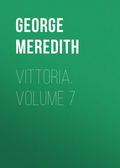
George Meredith
Vittoria. Complete
‘Or do you think that you have put your best poetry in the first Act?’ Rocco suggested with malice.
‘Not a bit of it!’ Agostino repudiated the idea very angrily, and puffed and puffed. Yet he said, ‘I should not be lamenting if the opera were stopped at once.’
‘No!’ cried Rocco; ‘let us have our one night. I bargain for that. Medole has played us false, but we go on. We are victims already, my Agostino.’
‘But I do stipulate,’ said Agostino, ‘that my jewel is not to melt herself in the cup to-night. I must see her. As it is, she is inevitably down in the list for a week’s or a month’s incarceration.’
Antonio-Pericles had this, in his case, singular piece of delicacy, that he refrained from the attempt to see Vittoria immediately after he had flung his magnificent bouquet of treasure at her feet. In his intoxication with the success which he had foreseen and cradled to its apogee, he was now reckless of any consequences. He felt ready to take patriotic Italy in his arms, provided that it would succeed as Vittoria had done, and on the spot. Her singing of the severe phrases of the opening chant, or hymn, had turned the man, and for a time had put a new heart in him. The consolation was his also, that he had rewarded it the most splendidly—as it were, in golden italics of praise; so that her forgiveness of his disinterested endeavour to transplant her was certain, and perhaps her future implicit obedience or allegiance bought. Meeting General Pierson, the latter rallied him.
‘Why, my fine Pericles, your scheme to get this girl out of the way was capitally concerted. My only fear is that on another occasion the Government will take another view of it and you.’
Pericles shrugged. ‘The Gods, my dear General, decree. I did my best to lay a case before them; that is all.’
‘Ah, well! I am of opinion you will not lay many other cases before the Gods who rule in Milan.’
‘I have helped them to a good opera.’
‘Are you aware that this opera consists entirely of political allusions?’
General Pierson spoke offensively, as the urbane Austrian military permitted themselves to do upon occasion when addressing the conquered or civilians.
‘To me,’ returned Pericles, ‘an opera—it is music. I know no more.’
‘You are responsible for it,’ said the General, harshly. ‘It was taken upon trust from you.’
‘Brutal Austrians!’ Pericles murmured. ‘And you do not think much of her voice, General?’
‘Pretty fair, sir.’
‘What wonder she does not care to open her throat to these swine!’ thought the changed Greek.
Vittoria’s door was shut to Agostino. No voice within gave answer. He tried the lock of the door, and departed. She sat in a stupor. It was harder for her to make a second appearance than it was to make the first, when the shameful suspicion cruelly attached to her had helped to balance her steps with rebellious pride; and more, the great collected wave of her ambitious years of girlhood had cast her forward to the spot, as in a last effort for consummation. Now that she had won the public voice (love, her heart called it) her eyes looked inward; she meditated upon what she had to do, and coughed nervously. She frightened herself with her coughing, and shivered at the prospect of again going forward in the great nakedness of stagelights and thirsting eyes. And, moreover, she was not strengthened by the character of the music and the poetry of the second Act:—a knowledge of its somewhat inferior quality may possibly have been at the root of Agostino’s dread of an anticlimax. The seconda donna had the chief part in it—notably an aria (Rocco had given it to her in compassion) that suited Irma’s pure shrieks and the tragic skeleton she could be. Vittoria knew how low she was sinking when she found her soul in the shallows of a sort of jealousy of Irma. For a little space she lost all intimacy with herself; she looked at her face in the glass and swallowed water, thinking that she had strained a dream and confused her brain with it. The silence of her solitary room coming upon the blaze of light the colour and clamour of the house, and the strange remembrance of the recent impersonation of an ideal character, smote her with the sense of her having fallen from a mighty eminence, and that she lay in the dust. All those incense-breathing flowers heaped on her table seemed poisonous, and reproached her as a delusion. She sat crouching alone till her tirewomen called; horrible talkative things! her own familiar maid Giacinta being the worst to bear with.
Now, Michiella, by making love to Leonardo, Camillo’s associate, discovers that Camillo is conspiring against her father. She utters to Leonardo very pleasant promises indeed, if he will betray his friend. Leonardo, a wavering baritono, complains that love should ask for any return save in the coin of the empire of love. He is seduced, and invokes a malediction upon his head should he accomplish what he has sworn to perform. Camilla reposes perfect confidence in this wretch, and brings her more doubtful husband to be of her mind.
Camillo and Camilla agree to wear the mask of a dissipated couple. They throw their mansion open; dicing, betting, intriguing, revellings, maskings, commence. Michiella is courted ardently by Camillo; Camilla trifles with Leonardo and with Count Orso alternately. Jealous again of Camilla, Michiella warns and threatens Leonardo; but she becomes Camillo’s dupe, partly from returning love, partly from desire for vengeance on her rival. Camilla persuades Orso to discard Michiella. The infatuated count waxes as the personification of portentous burlesque; he is having everything his own way. The acting throughout—owing to the real gravity of the vast basso Lebruno’s burlesque, and Vittoria’s archness—was that of high comedy with a lurid background. Vittoria showed an enchanting spirit of humour. She sang one bewitching barcarole that set the house in rocking motion. There was such melancholy in her heart that she cast herself into all the flippancy with abandonment. The Act was weak in too distinctly revealing the finger of the poetic political squib at a point here and there. The temptation to do it of an Agostino, who had no other outlet, had been irresistible, and he sat moaning over his artistic depravity, now that it stared him in the face. Applause scarcely consoled him, and it was with humiliation of mind that he acknowledged his debt to the music and the singers, and how little they owed to him.
Now Camillo is pleased to receive the ardent passion of his wife, and the masking suits his taste, but it is the vice of his character that he cannot act to any degree subordinately in concert; he insists upon positive headship!—(allusion to an Italian weakness for sovereignties; it passed unobserved, and chuckled bitterly over his excess of subtlety). Camillo cannot leave the scheming to her. He pursues Michiella to subdue her with blandishments. Reproaches cease upon her part. There is a duo between them. They exchange the silver keys, which express absolute intimacy, and give mutual freedom of access. Camillo can now secrete his followers in the castle; Michiella can enter Camilla’s blue-room, and ravage her caskets for treasonable correspondence. Artfully she bids him reflect on what she is forfeiting for him; and so helps him to put aside the thought of that which he also may be imperilling.
Irma’s shrill crescendos and octave-leaps, assisted by her peculiar attitudes of strangulation, came out well in this scene. The murmurs concerning the sour privileges to be granted by a Lazzeruola were inaudible. But there has been a witness to the stipulation. The ever-shifting baritono, from behind a pillar, has joined in with an aside phrase here and there. Leonardo discovers that his fealty to Camilla is reviving. He determines to watch over her. Camillo now tosses a perfumed handkerchief under his nose, and inhales the coxcombical incense of the idea that he will do all without Camilla’s aid, to surprise her; thereby teaching her to know him to be somewhat a hero. She has played her part so thoroughly that he can choose to fancy her a giddy person; he remarks upon the frequent instances of girls who in their girlhood were wild dreamers becoming after marriage wild wives. His followers assemble, that he may take advantage of the exchanged key of silver. He is moved to seek one embrace of Camilla before the conflict:—she is beautiful! There was never such beauty as hers! He goes to her in the fittest preparation for the pangs of jealousy. But he has not been foremost in practising the uses of silver keys. Michiella, having first arranged with her father to be before Camillo’s doors at a certain hour with men-at-arms, is in Camilla’s private chamber, with her hand upon a pregnant box of ebony wood, when she is startled by a noise, and slips into concealment. Leonardo bursts through the casement window. Camilla then appears. Leonardo stretches the tips of his fingers out to her; on his knees confesses his guilt and warns her. Camillo comes in. Thrusting herself before him, Michiella points to the stricken couple ‘See! it is to show you this that I am here.’ Behold occasion for a grand quatuor!
While confessing his guilt to Camilla, Leonardo has excused it by an emphatic delineation of Michiella’s magic sway over him. (Leonardo, in fact, is your small modern Italian Machiavelli, overmatched in cunning, for the reason that he is always at a last moment the victim of his poor bit of heart or honesty: he is devoid of the inspiration of great patriotic aims.) If Michiella (Austrian intrigue) has any love, it is for such a tool. She cannot afford to lose him. She pleads for him; and, as Camilla is silent on his account, the cynical magnanimity of Camillo is predisposed to spare a fangless snake. Michiella withdraws him from the naked sword to the back of the stage. The terrible repudiation scene ensues, in which Camillo casts off his wife. If it was a puzzle to one Italian half of the audience, the other comprehended it perfectly, and with rapture. It was thus that YOUNG ITALY had too often been treated by the compromising, merely discontented, dallying aristocracy. Camilla cries to him, ‘Have faith in me! have faith in me! have faith in me!’ That is the sole answer to his accusations, his threats of eternal loathing, and generally blustering sublimities. She cannot defend herself; she only knows her innocence. He is inexorable, being the guilty one of the two. Turning from him with crossed arms, Camilla sings:
‘Mother! it is my fate that I should know Thy miseries, and in thy footprints go. Grief treads the starry places of the earth: In thy long track I feel who gave me birth. I am alone; a wife without a lord; My home is with the stranger—home abhorr’d!—But that I trust to meet thy spirit there. Mother of Sorrows! joy thou canst not share: So let me wander in among the tombs, Among the cypresses and the withered blooms. Thy soul is with dead suns: there let me be; A silent thing that shares thy veil with thee.’
The wonderful viol-like trembling of the contralto tones thrilled through the house. It was the highest homage to Vittoria that no longer any shouts arose nothing but a prolonged murmur, as when one tells another a tale of deep emotion, and all exclamations, all ulterior thoughts, all gathered tenderness of sensibility, are reserved for the close, are seen heaping for the close, like waters above a dam. The flattery of beholding a great assembly of human creatures bound glittering in wizard subservience to the voice of one soul, belongs to the artist, and is the cantatrice’s glory, pre-eminent over whatever poor glory this world gives. She felt it, but she felt it as something apart. Within her was the struggle of Italy calling to Italy: Italy’s shame, her sadness, her tortures, her quenchless hope, and the view of Freedom. It sent her blood about her body in rebellious volumes. Once it completely strangled her notes. She dropped the ball of her chin in her throat; paused without ceremony; and recovered herself. Vittoria had too severe an artistic instinct to court reality; and as much as she could she from that moment corrected the underlinings of Agostino’s libretto.
On the other hand, Irma fell into all his traps, and painted her Austrian heart with a prodigal waste of colour and frank energy:
‘Now Leonardo is my tool:
Camilla is my slave:
And she I hate goes forth to cool
Her rage beyond the wave.
Joy! joy!
Paid am I in full coin for my caressing;
I take, but give nought, ere the priestly blessing.’
A subtle distinction. She insists upon her reverence for the priestly (papistical) blessing, while she confides her determination to have it dispensed with in Camilla’s case. Irma’s known sympathies with the Austrian uniform seasoned the ludicrousness of many of the double-edged verses which she sang or declaimed in recitative. The irony of applauding her vehemently was irresistible.
Camilla is charged with conspiracy, and proved guilty by her own admission.
The Act ends with the entry of Count Orso and his force; conspirators overawed; Camilla repudiated; Count Orso imperially just; Leonardo chagrined; Camillo pardoned; Michiella triumphant. Camillo sacrifices his wife for safety. He holds her estates; and therefore Count Orso, whose respect for law causes him to have a keen eye for matrimonial alliances, is now paternally willing, and even anxious to bestow Michiella upon him when the Pontifical divorce can be obtained; so that the long-coveted fruitful acres may be in the family. The chorus sings a song of praise to Hymen, the ‘builder of great Houses.’ Camilla goes forth into exile. The word was not spoken, but the mention of ‘bread of strangers, strange faces, cold climes,’ said sufficient.
‘It is a question whether we ought to sit still and see a firebrand flashed in our faces,’ General Pierson remarked as the curtain fell. He was talking to Major de Pyrmont outside the Duchess of Graatli’s box. Two General officers joined them, and presently Count Serabiglione, with his courtly semi-ironical smile, on whom they straightway turned their backs. The insult was happily unseen, and the count caressed his shaven chin and smiled himself onward. The point for the officers to decide was, whether they dared offend an enthusiastic house—the fiery core of the population of Milan—by putting a stop to the opera before worse should come.
Their own views were entirely military; but they were paralyzed by the recent pseudo-liberalistic despatches from Vienna; and agreed, with some malice in their shrugs, that the odium might as well be left on the shoulders of the bureau which had examined the libretto. In fact, they saw that there would be rank peril in attempting to arrest the course of things within the walls of the house.
‘The temper this people is changeing oddly,’ said General Pierson. Major de Pyrmont listened awhile to what they had to say, and returned to the duchess. Amalia wrote these lines to Laura:—‘If she sings that song she is to be seized on the wings of the stage. I order my carriage to be in readiness to take her whither she should have gone last night. Do you contrive only her escape from the house. Georges de P. will aid you. I adore the naughty rebel!’
Major de Pyrmont delivered the missive at Laura’s box. He went down to the duchess’s chasseur, and gave him certain commands and money for a journey. Looking about, he beheld Wilfrid, who implored him to take his place for two minutes. De Pyrmont laughed. ‘She is superb, my friend. Come up with me. I am going behind the scenes. The unfortunate impresario is a ruined man; let us both condole with him. It is possible that he has children, and children like bread.’
Wilfrid was linking his arm to De Pyrmont’s, when, with a vivid recollection of old times, he glanced at his uniform with Vittoria’s eyes. ‘She would spit at me!’ he muttered, and dropped behind.
Up in her room Vittoria held council with Rocco, Agostino, and the impresario, Salvolo, who was partly their dupe. Salvolo had laid a freshly-written injunction from General Pierson before her, bidding him to exclude the chief solo parts from the Third Act, and to bring it speedily to a termination. His case was, that he had been ready to forfeit much if a rising followed; but that simply to beard the authorities was madness. He stated his case by no means as a pleader, although the impression made on him by the prima donna’s success caused his urgency to be civil.
‘Strike out what you please,’ said Vittoria.
Agostino smote her with a forefinger. ‘Rogue! you deserve an imperial crown. You have been educated for monarchy. You are ready enough to dispense with what you don’t care for, and what is not your own.’
Much of the time was lost by Agostino’s dispute with Salvolo. They haggled and wrangled laughingly over this and that printed aria, but it was a deplorable deception of the unhappy man; and with Vittoria’s stronger resolve to sing the incendiary song, the more necessary it was for her to have her soul clear of deceit. She said, ‘Signor Salvolo, you have been very kind to me, and I would do nothing to hurt your interests. I suppose you must suffer for being an Italian, like the rest of us. The song I mean to sing is not written or printed. What is in the book cannot harm you, for the censorship has passed it; and surely I alone am responsible for singing what is not in the book—I and the maestro. He supports me. We have both taken precautions’ (she smiled) ‘to secure our property. If you are despoiled, we will share with you. And believe, oh! in God’s name, believe that you will not suffer to no purpose!’
Salvolo started from her in a horror of amazement. He declared that he had been miserably deceived and entrapped. He threatened to send the company to their homes forthwith. ‘Dare to!’ said Agostino; and to judge by the temper of the house, it was only too certain, that if he did so, La Scala would be a wrecked tenement in the eye of morning. But Agostino backed his entreaty to her to abjure that song; Rocco gave way, and half shyly requested her to think of prudence. She remembered Laura, and Carlo, and her poor little frightened foreign mother. Her intense ideal conception of her duty sank and danced within her brain as the pilot-star dances on the bows of a tossing vessel. All were against her, as the tempest is against the ship. Even light above (by which I would image that which she could appeal to pleading in behalf of the wisdom of her obstinate will) was dyed black in the sweeping obscuration; she failed to recollect a sentence that was to be said to vindicate her settled course. Her sole idea was her holding her country by an unseen thread, and of the everlasting welfare of Italy being jeopardized if she relaxed her hold. Simple obstinacy of will sustained her.
You mariners batten down the hatchways when the heavens are dark and seas are angry. Vittoria, with the same faith in her instinct, shut the avenues to her senses—would see nothing, hear nothing. The impresario’s figure of despair touched her later. Giacinta drove him forth in the act of smiting his forehead with both hands. She did the same for Agostino and Rocco, who were not demonstrative.
They knew that by this time the agents of the Government were in all probability ransacking their rooms, and confiscating their goods.
‘Is your piano hired?’ quoth the former.
‘No,’ said the latter, ‘are your slippers?’
They went their separate ways, laughing.
CHAPTER XXI
THE THIRD ACT
The libretto of the Third Act was steeped in the sentiment of Young Italy. I wish that I could pipe to your mind’s hearing any notion of the fine music of Rocco Ricci, and touch you to feel the revelations which were in this new voice. Rocco and Vittoria gave the verses a life that cannot belong to them now; yet, as they contain much of the vital spirit of the revolt, they may assist you to some idea of the faith animating its heads, and may serve to justify this history.
Rocco’s music in the opera of Camilla had been sprung from a fresh Italian well; neither the elegiac-melodious, nor the sensuous-lyrical, nor the joyous buffo; it was severe as an old masterpiece, with veins of buoyant liveliness threading it, and with sufficient distinctness of melody to enrapture those who like to suck the sugarplums of sound. He would indeed have favoured the public with more sweet things, but Vittoria, for whom the opera was composed, and who had been at his elbow, was young, and stern in her devotion to an ideal of classical music that should elevate and never stoop to seduce or to flatter thoughtless hearers. Her taste had directed as her voice had inspired the opera. Her voice belonged to the order of the simply great voices, and was a royal voice among them. Pure without attenuation, passionate without contortion, when once heard it exacted absolute confidence. On this night her theme and her impersonation were adventitious introductions, but there were passages when her artistic pre-eminence and the sovereign fulness and fire of her singing struck a note of grateful remembered delight. This is what the great voice does for us. It rarely astonishes our ears. It illumines our souls, as you see the lightning make the unintelligible craving darkness leap into long mountain ridges, and twisting vales, and spires of cities, and inner recesses of light within light, rose-like, toward a central core of violet heat.
At the rising of the curtain the knights of the plains, Rudolfo, Romualdo, Arnoldo, and others, who were conspiring to overthrow Count Orso at the time when Camillo’s folly ruined all, assemble to deplore Camilla’s banishment, and show, bereft of her, their helplessness and indecision. They utter contempt of Camillo, who is this day to be Pontifically divorced from his wife to espouse the detested Michiella. His taste is not admired.
They pass off. Camillo appears. He is, as he knows, little better than a pensioner in Count Orso’s household. He holds his lands on sufferance. His faculties are paralyzed. He is on the first smooth shoulder-slope of the cataract. He knows that not only was his jealousy of his wife groundless, but it was forced by a spleenful pride. What is there to do? Nothing, save resignedly to prepare for his divorce from the conspiratrix Camilla and espousals with Michiella. The cup is bitter, and his song is mournful. He does the rarest thing a man will do in such a predicament—he acknowledges that he is going to get his deserts. The faithfulness and purity of Camilla have struck his inner consciousness. He knows not where she may be. He has secretly sent messengers in all directions to seek her, and recover her, and obtain her pardon: in vain. It is as well, perhaps, that he should never see her more. Accursed, he has cast off his sweetest friend. The craven heart could never beat in unison with hers.
‘She is in the darkness: I am in the light. I am a blot upon the light; she is light in the darkness.’
Montini poured this out with so fine a sentiment that the impatience of the house for sight of its heroine was quieted. But Irma and Lebruno came forward barely under tolerance.
‘We might as well be thumping a tambourine,’ said Lebruno, during a caress. Irma bit her underlip with mortification. Their notes fell flat as bullets against a wall.
This circumstance aroused the ire of Antonio-Pericles against the libretto and revolutionists. ‘I perceive,’ he said, grinning savagely, ‘it has come to be a concert, not an opera; it is a musical harangue in the marketplace. Illusion goes: it is politics here!’
Carlo Ammiani was sitting with his mother and Luciano breathlessly awaiting the entrance of Vittoria. The inner box-door was rudely shaken: beneath it a slip of paper had been thrust. He read a warning to him to quit the house instantly. Luciano and his mother both counselled his departure. The detestable initials ‘B. R.,’ and the one word ‘Sbirri,’ revealed who had warned, and what was the danger. His friend’s advice and the commands of his mother failed to move him. ‘When I have seen her safe; not before,’ he said.
Countess Ammiani addressed Luciano: ‘This is a young man’s love for a woman.’
‘The woman is worth it,’ Luciano replied.
‘No woman is worth the sacrifice of a mother and of a relative.’
‘Dearest countess,’ said Luciano, ‘look at the pit; it’s a cauldron. We shall get him out presently, have no fear: there will soon be hubbub enough to let Lucifer escape unseen. If nothing is done to-night, he and I will be off to the Lago di Garda to-morrow morning, and fish and shoot, and talk with Catullus.’
The countess gazed on her son with sorrowful sternness. His eyes had taken that bright glazed look which is an indication of frozen brain and turbulent heart—madness that sane men enamoured can be struck by. She knew there was no appeal to it.
A very dull continuous sound, like that of an angry swarm, or more like a rapid mufed thrumming of wires, was heard. The audience had caught view of a brown-coated soldier at one of the wings. The curious Croat had merely gratified a desire to have a glance at the semicircle of crowded heads; he withdrew his own, but not before he had awakened the wild beast in the throng. Yet a little while and the roar of the beasts would have burst out. It was thought that Vittoria had been seized or interdicted from appearing. Conspirators—the knights of the plains—meet: Rudolfos, Romualdos, Arnoldos, and others,—so that you know Camilla is not idle. She comes on in the great scene which closes the opera.
It is the banqueting hall of the castle. The Pontifical divorce is spread upon the table. Courtly friends, guards, and a choric bridal company, form a circle.
‘I have obtained it,’ says Count Orso: ‘but at a cost.’
Leonardo, wavering eternally, lets us know that it is weighted with a proviso: IF Camilla shall not present herself within a certain term, this being the last day of it. Camillo comes forward. Too late, he has perceived his faults and weakness. He has cast his beloved from his arms to clasp them on despair. The choric bridal company gives intervening strophes. Cavaliers enter. ‘Look at them well,’ says Leonardo. They are the knights of the plains. ‘They have come to mock me,’ Camillo exclaims, and avoids them.
Leonardo, Michiella, and Camillo now sing a trio that is tricuspidato, or a three-pointed manner of declaring their divergent sentiments in harmony. The fast-gathering cavaliers lend masculine character to the choric refrains at every interval. Leonardo plucks Michiella entreatingly by the arm. She spurns him. He has served her; she needs him no more; but she will recommend him in other quarters, and bids him to seek them. ‘I will give thee a collar for thy neck, marked “Faithful.” It is the utmost I can do for thy species.’ Leonardo thinks that he is insulted, but there is a vestige of doubt in him still. ‘She is so fair! she dissembles so magnificently ever!’ She has previously told him that she is acting a part, as Camilla did. Irma had shed all her hair from a golden circlet about her temples, barbarian-wise. Some Hunnish grandeur pertained to her appearance, and partly excused the infatuated wretch who shivered at her disdain and exulted over her beauty and artfulness.
In the midst of the chorus there is one veiled figure and one voice distinguishable. This voice outlives the rest at every strophe, and contrives to add a supplemental antiphonic phrase that recalls in turn the favourite melodies of the opera. Camillo hears it, but takes it as a delusion of impassioned memory and a mere theme for the recurring melodious utterance of his regrets. Michiella hears it. She chimes with the third notes of Camillo’s solo to inform us of her suspicions that they have a serpent among them. Leonardo hears it. The trio is formed. Count Orso, without hearing it, makes a quatuor by inviting the bridal couple to go through the necessary formalities. The chorus changes its measure to one of hymeneals. The unknown voice closes it ominously with three bars in the minor key. Michiella stalks close around the rank singers like an enraged daughter of Attila. Stopping in front of the veiled figure, she says: ‘Why is it thou wearest the black veil at my nuptials?’
‘Because my time of mourning is not yet ended.’
‘Thou standest the shadow in my happiness.’
‘The bright sun will have its shadow.’
‘I desire that all rejoice this day.’
‘My hour of rejoicing approaches.’
‘Wilt thou unveil?’
‘Dost thou ask to look the storm in the face?’
‘Wilt thou unveil?’
‘Art thou hungry for the lightning?’
‘I bid thee unveil, woman!’
Michiella’s ringing shriek of command produces no response.
‘It is she!’ cries Michiella, from a contracted bosom; smiting it with clenched hands.
‘Swift to the signatures. O rival! what bitterness hast thou come hither to taste.’
Camilla sings aside: ‘If yet my husband loves me and is true.’
Count Orso exclaims: ‘Let trumpets sound for the commencement of the festivities. The lord of his country may slumber while his people dance and drink!’
Trumpets flourish. Witnesses are called about the table. Camillo, pen in hand, prepares for the supreme act. Leonardo at one wing watches the eagerness of Michiella. The chorus chants to a muted measure of suspense, while Camillo dips pen in ink.
‘She is away from me: she scorns me: she is lost to me. Life without honour is the life of swine. Union without love is the yoke of savage beasts. O me miserable! Can the heavens themselves plumb the depth of my degradation?’
Count Orso permits a half-tone of paternal severity to point his kindly hint that time is passing. When he was young, he says, in the broad and benevolently frisky manner, he would have signed ere the eye of the maiden twinkled her affirmative, or the goose had shed its quill.
Camillo still trifles. Then he dashes the pen to earth.
‘Never! I have but one wife. Our marriage is irrevocable. The dishonoured man is the everlasting outcast. What are earthly possessions to me, if within myself shame faces me? Let all go. Though I have lost Camilla, I will be worthy of her. Not a pen no pen; it is the sword that I must write with. Strike, O count! I am here: I stand alone. By the edge of this sword, I swear that never deed of mine shall rob Camilla of her heritage; though I die the death, she shall not weep for a craven!’







